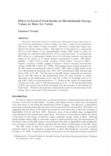Effect of Level of Feed Intake on Metabolizable Energy Values in Diets for Cattle
Tropical agriculture research series : proceedings of a symposium on tropical agriculture researches
| ISSN | 03889386 |
|---|---|
| NII recode ID (NCID) | AA00870529 |

Full text
tars25-_193-198.pdf944.12 KB
Recently, feed intake levels of cattle have increased by more than three to five times the maintenance levels in Japan. In order to improve the production efficiency, feed intake is being increased. However a large feed intake may depress the energy values of diets. The objective of this report is to analyse the effect of feed intake on the metabolizable energy (ME) values of diets for lactating cows and beef cattle fed 30 to 70 % concentrate diets. To estimate the ME values at a maintenance intake level, the following equation was derived based on the results of 19 energy balance experiments in goats ; ME (Mcal/kgDM)= -2.062+0.0751 Xcrude protein+0.1025 Xether extract+0.0481 x organic a fraction +0.0285Xorganic b fraction +0.0515Xnitrogen cell wall free extract, %DM (SE=0.0613, R2=0.908). This equation gave a good accuracy for the ME values of maintenance diets in cattle. ME values at high intake levels were determined in lactating cows (1.84-3.87Xmaintenance (M)) and growing steers (1.89-2.12XM). The decrease in the ME values, expressed as a percentage of the ME value at the maintenance level for each increase in intake equivalent to the maintenance level, was 3.92±1.82% for lactating cows (n=5) and 3.06±1.90% for growing steers (n=7). Based on the results of experiments carried out in dry cows (1 X M) and lactating cows (3-4 X M) fed the same kind of diets, the energy loss in feces increased with the increase of the amount of feed intake. However the loss was compensated in part by the decrease of the energy loss in urine and of the formation of methane.
| Date of issued | |
|---|---|
| Creator | Fuminori Terada |
| Publisher | Japan International Research Center for Agricultural Sciences |
| Volume | 25 |
| spage | 193 |
| epage | 198 |
| Language | eng |
